Declarations of war during World War II
This is a timeline of formal declarations of War during World War II.
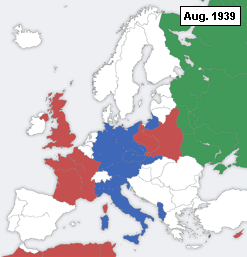
A declaration of war is a formal act by which one nation goes to war against another. The declaration is usually an act of delivering a performative speech (not to be confused with a mere speech) or the presentation of a signed document by an authorized party of a national government in order to create a state of war between two or more sovereign states. The official international protocol for declaring war was defined in The Hague Peace Conference of 1907 (or Hague II).[1] For the diplomatic maneuvering behind these events, which led to hostilities between nations during World War II, see the article entitled Diplomatic history of World War II.
List of war declarations
Below is a table showing the outbreak of wars between nations which occurred during World War II. Indicated are the dates (during the immediate build-up to, or during the course of, World War II), from which a de facto state of war existed between nations. The table shows both the "Initiator Nation(s)" and the nation at which the aggression was aimed, or "Targeted Nation(s)". Events listed include those in which there were simple diplomatic breaking of relations that did not involve any physical attack, as well as those involving overt declarations or acts of aggression. In rare cases, war between two nations occurred twice, with an intermittent period of peace. The list here does not include peace treaties or periods of any armistice.
Table Legend: Concerning Declaration of War:
A = Attack without prior, formal declaration of war;
C = Declaration and/or attack without standard, formal procedure, sometimes preceded by a casus belli thus fait accompli;
U = State of war arrived at through use of ultimatum;
W = Formal declaration of war made.
| Date | Initiator nation(s) | Targeted nation(s) | Declaration of war: Type | Notes/comments | Document/event |
|---|---|---|---|---|---|
| 1939-09-01 | U[2][3] | German attack began at 4:44 a.m., Berlin and Warsaw time.[4][2][5] | Invasion | ||
| 1939-09-01 | A | Invasion | |||
| 1939-09-03 | U[2][3] | At 11:15 a.m. London time,[6] British PM, Neville Chamberlain publicly delivered his Ultimatum Speech.[3][7][8] As the Statute of Westminster 1931 was not yet ratified by the parliaments of Australia, and New Zealand, the British declaration of war on Germany also applied to the following dominions. | United Kingdom declaration, French declaration | ||
| 1939-09-04 | W |
Declaration | |||
| 1939-09-05 | W[2][3] | Declaration | |||
| 1939-09-10 | W[2][3] | Declaration
Declaration | |||
| 1939-09-17 | A[2][3] | Invasion | |||
| 1939-11-09 | W | Kuwaiti Declaration of War | |||
| 1939-11-30 | A[2][3] | Second war between these nations (after Finnish invasion in 1918–1920). | Invasion | ||
| 1940-04-09 | A[2] | Invasion of Denmark Invasion of Norway | |||
| 1940-04-12 | A[3] | Invasion | |||
| 1940-05-10 | A/W[2][3] | Date of the German offensive in the West, W from Belgium and the Netherlands.[9] | |||
| 1940-05-10 | A[3] | Luxembourg | |||
| 1940-05-10 | A | Invasion | |||
| 1940-06-10 | W[2][3] | France and the UK | |||
| 1940-06-10 | W[2] | Declaration | |||
| 1940-06-11 | W[2] |
South Africa Australia New Zealand | |||
| 1940-06-11 | W[2] | Declaration | |||
| 1940-06-25 | A | Vichy France cuts off diplomatic relations with the United Kingdom on 8 July 1940. | Attack | ||
| 1940-09-09 | A | Egypt never formally declared war on Italy. | Invasion | ||
| 1940-09-22 | A | Invasion | |||
| 1940-09-23 | A | Invasion | |||
| 1940-10-?? | A | Franco-Thai War | |||
| 1940-10-28 | U[3] | Italy invades Greece | Invasion | ||
| 1941-02-05 | A | Invasion | |||
| 1941-04-06 | W[2][3] | Invasion | |||
| 1941-04-06 | A[2][3] | Invasion | |||
| 1941-04-06 | A[3] | Invasion | |||
| 1941-04-07 | A[10] | After the German invasion, bombing of Hungarian locations | Invasion | ||
| 1941-04-14 | A | Egypt did not formally declare war until 1945. | Invasion | ||
| 1941-05-02 | A | Invasion | |||
| 1941-06-08 | A | Invasion | |||
| 1941-06-22 | A[2][3] | A timed-declaration of war was given by Germany at the time of the attack[11] | Invasion | ||
| 1941-06-22 | Tuva | W | Tuva was a client state of the Soviet Union. Part of the USSR from 1944. | ||
| 1941-06-25 | W | Finland recognized a state of war with the Soviet Union; third war between these nations. | Continuation War | ||
| 1941-06-27 | C[10] | After the bombing of several Hungarian locations, the Hungarian military concluded a Soviet attack, the Government had decided the two countries were already belligerent, without the consent of the Parliament, in absence of the Regent | Invasion | ||
| 1941-08-25 | A | Invasion | |||
| 1941-12-05 | W[12] | Declaration | |||
| 1941-12-07 | A[2] | W (Japanese point of view); A (British Empire and United States) | |||
| 1941-12-07 | W[3] | Declaration | |||
| 1941-12-07 | W[3] | Declaration | |||
| 1941-12-08 | W[3] | United States declaration
British declaration
| |||
| 1941-12-08 | W[3] | South African declaration | |||
| 1941-12-08 | W |
Mongolian declaration | |||
| 1941-12-08 | W[3] | Declaration | |||
| 1941-12-09 | W[3] |
Australian declaration New Zealand's declaration | |||
| 1941-12-09 | W[3] | China and Japan had been at undeclared war since 1937 | Second Sino-Japanese war
Declaration | ||
| 1941-12-11 | W[2][3] |
German declaration | |||
| 1941-12-11 | W[2] | Germany | |||
| 1941-12-11 | W[2] | Japan rejected declaration of War. Prime Minister Hideki Tōjō's answer was following: "We don't accept the Polish declaration of war. The Poles, fighting for their freedom, declared war under the British pressure". | |||
| 1941-12-12 | W[3] |
Romanian declaration Bulgarian declaration | |||
| 1941-12-12 | A | Portugal maintained neutrality throughout World War II. | |||
| 1941-12-13 | W[3] |
British declaration New Zealand's declaration South African declaration | |||
| 1941-12-15 | C[13] | The Prime Minister informed the U.S. ambassador without approval of the Parliament and the Regent, but initially denied it would mean "war" in fact, however two days later he declared it means the two countries became belligerent. As the ambassador refused to accept the verbal form if this act, the next day the Prime Minister in written reinforced it. | Declaration | ||
| 1941-12-14 | W[3] | Declaration | |||
| 1941-12-16 | W | Declaration | |||
| 1941-12-17 | W | Declaration | |||
| 1941-12-20 | W | Declaration | |||
| 1942-01-01 | United Nations | Axis Powers | W | Declared during Arcadia Conference | Declaration |
| 1942-01-06 | W | Declaration | |||
| 1942-01-16 | W | Declaration | |||
| 1942-01-25 | A | Declaration | |||
| 1942-01-25 | W |
British declaration New Zealand's declaration South African declaration | |||
| 1942-02-12 | W | Declaration | |||
| 1942-02-19 | A | Portugal maintained neutrality throughout World War II. | Invasion | ||
| 1942-05-05 | A | Invasion | |||
| 1942-05-05 | A | Invasion | |||
| 1942-05-22 | W[3] | Declaration | |||
| 1942-06-05 | W[10] | Declaration | |||
| 1942-06-13 | W | Only Native American tribe to have declared war on the Axis powers separately from the United States (other native nations de facto declared war with tribal citizens enlisting in the Armed Forces). Announced on the steps of the U.S. Capitol by a representative that "a state of war exists between our Confederacy of Six Nations on the one part and Germany, Italy, Japan and their allies against whom the United States has declared war, on the other part." | Declaration | ||
| 1942-08-22 | W | Declaration | |||
| 1942-11-08 | A | Invasion | |||
| 1942-11-10 | A | Invasion | |||
| 1942-11-12 | A | German invasion via airlifting serval divisions in reaction to Operation Torch, swiftly occupying Tunis and the eastern part of the country, and capturing the western portions after French Tunisian resistance before the allies reached the Tunisian border. In the resulting Tunisian campaign, the Allies finally defeated the Axis forces in Africa. | Invasion | ||
| 1942-12-14 | W | On 3 October 1935, Italy invaded Ethiopia without a formal declaration of war. In response to the Italian invasion, Ethiopia declared war on Italy. Most of Ethiopia was occupied by Italy in 1936, however parts of Ethiopia remained under the control of the Ethiopian Patriots Movement, which begun its guerrilla war against the occupying Italian forces the day Addis Ababa fell in May 1936. In May 1941, Addis Ababa was liberated by the Gideon Force, restoring sovereignty to Ethiopia. | Second Italo-Ethiopian War
Declaration | ||
| 1943-01-20 | W | President Ríos officially suspended all trade and diplomatic relations with the Axis powers, and Chile officially joined the Allies as authorities began rooting out Nazi spies from Operation Bolivar. While only declaring war on Germany and Italy (although Chile would not declare war on Japan until 1945, it began imprisoning Japanese nationals in 1943), the American government and international press celebrated this day as Chile declaring war on the Axis. | Declaration | ||
| 1943-04-02 | Axis powers | W | Bolivia officially joined the Allies on 7 April 1943. Shortly after war was declared, the President, Enrique Peñaranda, was overthrown in a coup. Bolivian mines supplied needed tin to the Allies, but no troops or warplanes were sent overseas. Bolivians remained confident their geographic isolation would protect them from the war. | Declaration | |
| 1943-09-01 | Allied Powers | W | Declaration | ||
| 1943-09-09 | W | Declaration | |||
| 1943-10-13 | W[2] | Italy had changed sides after the fall of Mussolini. The Declaration of War was given by Pietro Badoglio to the German ambassador in Madrid.[2] | Declaration | ||
| 1943-11-26 | W | See Colombia during World War II | Declaration | ||
| 1944-01-17 | A | Invasion | |||
| 1944-01-27 | W | Declaration | |||
| 1944-06-06 | A | Invasion | |||
| 1944-07-25 | A | Invasion | |||
| 1944-08-25 | W | Romania switched sides | Declaration | ||
| 1944-09-05 | W | Declaration | |||
| 1944-09-08 | W | Bulgaria switched sides | Declaration | ||
| 1944-09-15 | A | Lapland War | |||
| 1944-09-23 | W[15] | Philippine declaration | |||
| 1945-02-02 | W | Ecuadorian declaration | |||
| 1945-02-07 | W |
Argentinean declaration Paraguayan declaration | |||
| 1945-02-15 | W |
Venezuelan declaration Uruguayan declaration | |||
| 1945-02-21 | W | Declaration | |||
| 1945-02-23 | W | Declaration | |||
| 1945-02-24 | W | Declaration | |||
| 1945-02-26 | W | Declaration | |||
| 1945-02-28 | W | Declaration | |||
| 1945-03-03 | W | Finland switched sides | Lapland War | ||
| 1945-04-01 | W | Declaration | |||
| 1945-04-11 | W | Declaration | |||
| 1945-07-06 | W | Declaration | |||
| 1945-07-09 | W | Declaration[16] | |||
| 1945-07-14 | W | Declaration | |||
| 1945-08-08 | W[2] | Last outbreak of war during the entire Second World War. | Declaration | ||
| 1945-08-10 | W[17] | W (de jure) A (de facto 1945-08-09) War declared 24 hours after crossing the border with Soviet troops |
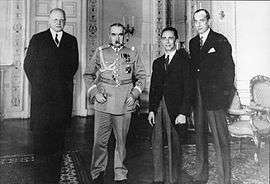 German ambassador, Hans-Adolf von Moltke, Polish leader Józef Piłsudski, German propaganda minister Joseph Goebbels and Józef Beck, Polish Foreign minister meeting in Warsaw on June 15, 1934, five months after signing the Polish-German Non-Aggression Pact.
German ambassador, Hans-Adolf von Moltke, Polish leader Józef Piłsudski, German propaganda minister Joseph Goebbels and Józef Beck, Polish Foreign minister meeting in Warsaw on June 15, 1934, five months after signing the Polish-German Non-Aggression Pact.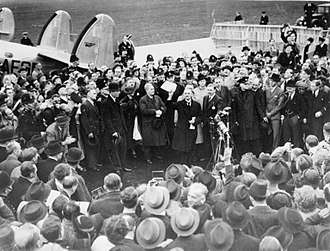 British Prime Minister Neville Chamberlain, landing at Heston aerodrome on 30 September 1938 after his meeting with Hitler at Munich. In his hand he holds the peace agreement between Britain and Germany.
British Prime Minister Neville Chamberlain, landing at Heston aerodrome on 30 September 1938 after his meeting with Hitler at Munich. In his hand he holds the peace agreement between Britain and Germany.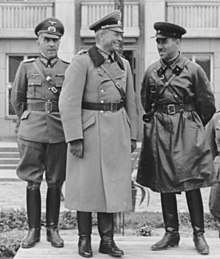 Common parade of German Wehrmacht and Soviet Red Army on September 23, 1939 in Brest, Eastern Poland at the end of the Poland Campaign. In the center is Major General Heinz Guderian; and on the right is Brigadier General Semyon Krivoshein.
Common parade of German Wehrmacht and Soviet Red Army on September 23, 1939 in Brest, Eastern Poland at the end of the Poland Campaign. In the center is Major General Heinz Guderian; and on the right is Brigadier General Semyon Krivoshein. Counsellor of state J.K. Paasikivi and his team arriving from Moscow for the first round of negotiations on 16 October 1939. From left, minister Aarno Yrjö-Koskinen, J.K. Paasikivi, chief of staff Johan Nykopp and colonel Aladár Paasonen.
Counsellor of state J.K. Paasikivi and his team arriving from Moscow for the first round of negotiations on 16 October 1939. From left, minister Aarno Yrjö-Koskinen, J.K. Paasikivi, chief of staff Johan Nykopp and colonel Aladár Paasonen. German paratroopers taking the Greek island of Crete, May 1941.
German paratroopers taking the Greek island of Crete, May 1941.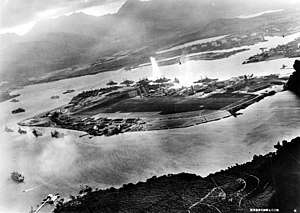 Photograph from a Japanese plane of Battleship Row at the beginning of the surprise Attack on Pearl Harbor. The explosion in the center is a torpedo strike on the USS Oklahoma. Two attacking Japanese planes can be seen: one over the USS Neosho and one over the Naval Yard.
Photograph from a Japanese plane of Battleship Row at the beginning of the surprise Attack on Pearl Harbor. The explosion in the center is a torpedo strike on the USS Oklahoma. Two attacking Japanese planes can be seen: one over the USS Neosho and one over the Naval Yard.
Literature about the war
- Harman, Nicholas (1990). Dunkirk: the Necessary Myth. Jove. ISBN 978-0340517857.
- German White Book. All World Wars.
- Hitler, Adolph (2012). The Great Tragedy: Germany's Declaration of War against the United States of America. ISBN 978-1300127703.
- Torrie, Julia S. (2010). "For Their Own Good": Civilian Evacuations in Germany and France, 1939–1945. Berghahn Books. ISBN 978-1845457259.
References
- On the Opening of Hostilities; 1907; Yale Law School Library; retrieved March 2014.
- "2194 Days of War"; (1977); Salmaggi, C. & Pallasvini, A.; ISBN 91-582-0426-1; per tables included. [Italian; American]
- Timeline Data Archived May 5, 2016, at the Wayback Machine; World at War online; retrieved February 2014.
- "Germans invade Poland". History.com. Retrieved 1 Dec 2019.
- On This Day
- Mann, Andrea. "September 3, 1939: Britain declares war on Germany after Hitler's troops invade Poland". BT.com. Retrieved 1 Dec 2019.
- Note: Included in the speech: "...This morning, the British Ambassador in Berlin handed the German Government a final note, stating that unless we heard from them by 11 O'clock that they were prepared at once to withdraw their troops from Poland a state of war would exist between us. I have to tell you now that no such undertaking has been received and that consequently this country is at war with Germany..."
- 1939: Britain and France declare war on Germany, BBC
- Swedish Encyklopedia; "Bonniers Lexikon" (Vol. 1); (c.1960s); table in article by Andra Världskriget: The Second World War; Pp. 461-462.
- "Táblázat az egyes államok hadiállapotba kerüléséről". arcanum.hu. Arcanum Adatbázis Kft.
- "The Rise and Fall of the Third Reich"; Shirer, William L
- Declaration of War on Finland, Hungary and Romania
- Draveczki-Ury, Ádám (11 December 2011). "Hetven éve történt: hadüzenet az Egyesült Államoknak". honvedelem.hu. Honvédelmi Minisztérium.
- all countries at war with the United States, United Kingdom, or the Soviet Union
- https://trove.nla.gov.au/newspaper/article/2634950
- Christopher P. Atwood (1999), "Sino-Soviet Diplomacy and the Second Partition of Mongolia, 1945–1946", Mongolia in the Twentieth Century: Landlocked Cosmopolitan, Bruce A. Elleman and Stephen Kotkin, eds. (Armonk, NY: M. E. Sharpe), 147.